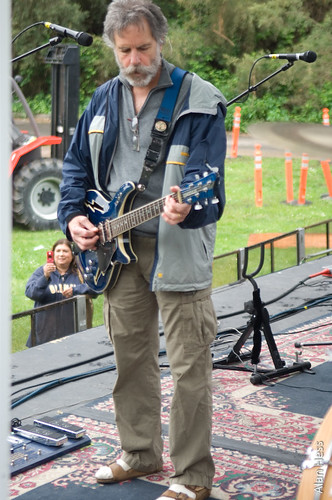3 weeks ago
Thursday, September 20, 2007
Buzz Editor's Column: Sirius Satellite radio writes new entry in Grateful Dead timeline
By ALAN SHECKTER - Buzz Editor
Article Launched: 09/20/2007 12:00:00 AM PDT
The Grateful Dead's Bob Weir is pictured recently in Sirius Satellite Radio's studios in New York...
On Sept. 7, Sirius Satellite radio, which streams some 120 mostly commercial-free stations for a $12.95 monthly, began beaming its latest, the Grateful Dead Channel.
Not surprisingly, given the band's massive live concert archive and its popularity —The Dead was typically among the leaders in annual concert attendance despite a dearth of hit albums — Sirius called it one of the most anticipated channel launches in its history.
Dead percussionist Mickey Hart, who is coming to Chico's Laxson Auditorium Sept. 27 with his Global Drum group, said he loves it. I trust he's getting royalties from the station, though in a phone interview he seemed unclear, and uninterested, how much that might be.
"I'm over the top with it," Hart said via phone from his Sonoma County home. "I don't sit and listen to Grateful Dead music; all I hear are the mistakes. But the other day I turned it on and started playing (drums) to it. I had two or three hours with it and was just overjoyed, and it was so good and it gave me chills."
The channel features an unending array of live material culled from 30 years of live performances —including complete live concerts each day — as well as occasional new and archival interviews.
For me personally, it's a swell development, like the day they invented something called ESPN or MTV. After attending a Grateful Dead show at the Tower Theatre near Philadelphia in 1976, I dabbled in the traveling musical carnival until it
ended with Jerry Garcia's death in 1995. I never dropped out of society or quit my job to go on the road with The Dead. For us, we were like baseball fans following our team. And with a repertoire of a couple hundred songs, and only about 15 to 20 getting played each night, every game's (or concert's) boxscore was different.
Of course, while many might cringe at the thought of such an idea, a 24-hour-a-day network dedicated to the San Francisco band —"Darned hippies!" they may say — I'd like to point out how far the technology has come for those of us who've embraced Grateful Dead music.
Trading recordings of the band's live recordings can be traced back to the Free Underground Grateful Dead Tape Exchange on the early 1970s. Though it's common now for many bands' fans to record and swap shows, these audio pioneers recognized the uniqueness of each show and recorded them for posterity.
Trouble was, making copies was tedious and logistically difficult. Worse, the quality of audio cassettes, the universal medium for many years, steadily declined from copy to copy. A seventh-generation version of what was once a pristine sound board tape became a hissy mess after it had been copied from cassette to cassette.
Nowadays, folks who still trade live music material do so digitally, of course, so the sound loss has been eliminated. And sites such as www.sugarmegs.org and www.archive.org offer giant banks of audio files.
And now, when I'm in my pickup, I not only have ESPN radio, CNN radio and many cool music stations, but I have the ultimate live mix of Grateful Dead music at my fingertips.
By the way, many academic courses have been devoted to the sociology of the Grateful Dead community. And Tuesday it was announced that the University of Massachusetts in November will host the first major university conference on the enduring legacy of the Grateful Dead experience.
Buzz Editor Alan Sheckter can be reached at 896-7771 or buzz@chicoer.com.






